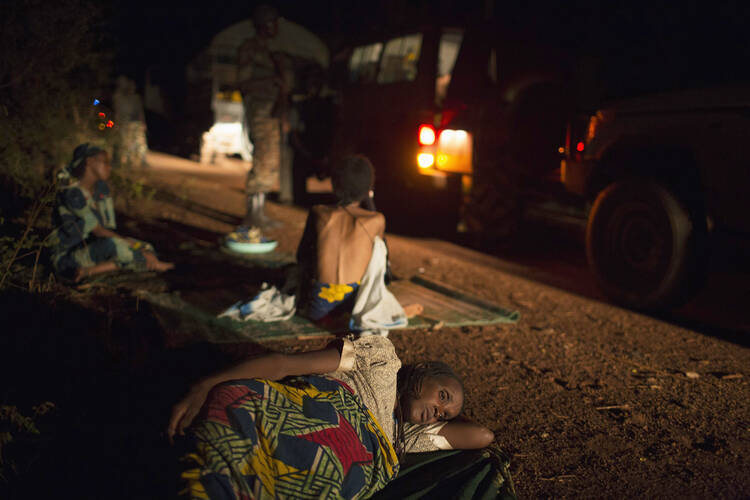Catholic bishops in the Central African Republic criticized their country's transitional government for failing to "revive hopes" and end months of conflict between Islamist and Christian forces despite international backing.
The bishops said July 2 that the January election of President Catherine Samba-Panza by members of the National Transition Council had been intended to "turn a new page in the country's dismal recent history." Instead, the bishops charged, Samba-Panza's government had "shown laxity" in tackling human rights violations and holding back rival armed groups despite support provided by thousands of peacekeepers backed by the United Nations and European Union.
The message was published after the bishops met in late June in Bangui, the capital, as thousands of displaced people sought refuge from fighting in the Cathedral of St. Joseph in Bambari, 150 miles to the northeast.
The African Press Agency reported that 82 people had been killed and 176 homes destroyed in the latest fighting between Seleka remnants and Anti-Balaka militia at Bambari.
Bishop Eduard Mathos of Bambari told the Vatican's Fides news agency the violence led 12,000 people to seek shelter in the diocese's Cathedral of St Joseph. Refugees were "totally without any assistance," and in response the diocese launched an appeal "to prevent a humanitarian disaster," he said.
Thousands of Central Africans have died and up to 1.5 million people have been displaced by violence since December 2012. Islamists, known as Seleka, have been clashing with groups from a mostly Christian militia, known as Anti-Balaka, despite the deployment of thousands of French and African peacekeepers.
In their message, the bishops said more than half of the Central African Republic's 4.4 million inhabitants need assistance. The total included 542,000 people who were internally displaced and an additional 102,000 people who fled to neighboring Cameroon. The rest are not displaced, but need assistance with food, health care and other essentials.
"Central Africans were led to hope this crisis would be resolved peacefully and harmoniously through firm action, but this hope has been sadly slow to materialize," the bishops said.
"Killings, burnings of homes and whole villages, tracking of people in the wilds -- these have become anodyne acts with no judicial comeback. Human life seems to have no value," the statement said.
The bishops "condemned with the greatest firmness" recent acts of vandalism at Christian churches and attacks on Catholic clergy in Bangui, Bossangoa, Bozoum and elsewhere.
"The aspiration to happiness, peace and social cohesion has sustained the Central African population through the worst crisis in its history, but despite all efforts by the different protagonists, the course is still beset with obstacles," the bishops said in a statement released on July 2.
"Insecurity still rules the streets and the law belongs to holders of illegal weapons. It's the law of the jungle, where the strongest impose themselves by force."
The bishops said most children were unable to attend classes, making education "a luxury reserved for only the privileged few." They said the country also faced a health and sanitation crisis, which was compounded by illegal exploitation of mining and forestry resources.
The message said the Catholic Church stood by its previous demands for the reconstruction of the Central African Republic's armed forces and "non-negotiable disarmament," as well as for firm action of promote social cohesion, justice and reconciliation. "Re-establishing the state's authority nationwide will mean redeploying administration and a frenzied fight against impunity -- for obvious reasons of insecurity, many areas are abandoned today to the mercy of armed groups who make the law as it pleases and suits them," the bishops said.








